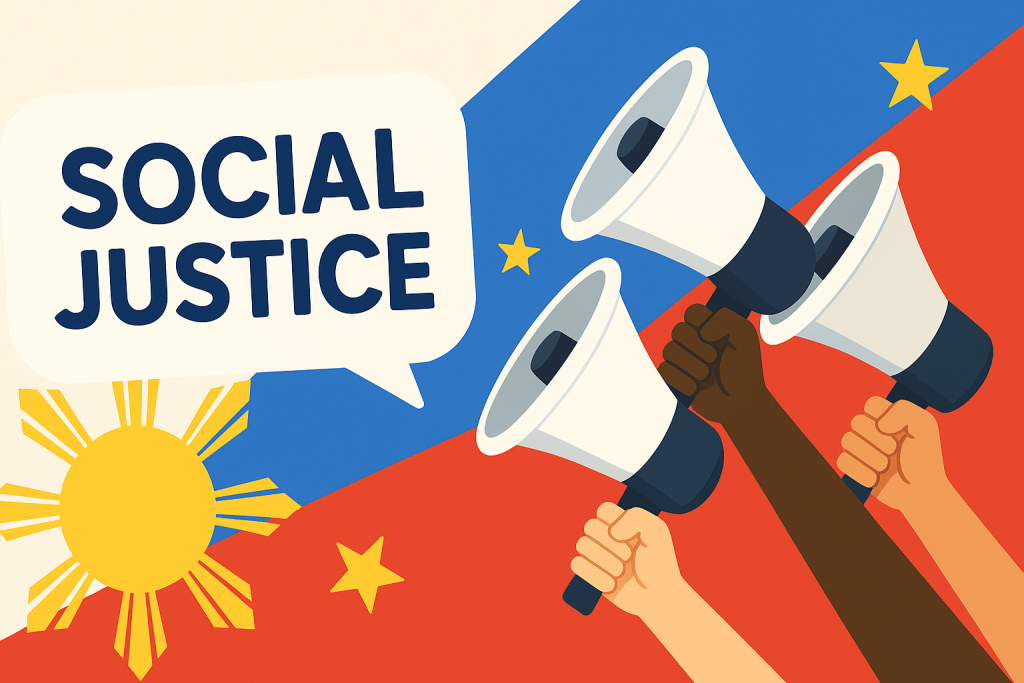Social justice on my mind
By Randell Tiongson on September 12th, 2025
Open your feed and you’ll see it everywhere: “social justice.” Ask ten people what the biggest justice issue is and you’ll get many answers—poverty, corruption, crime, orphans, abuse, sex trafficking, broken families, education gaps, inequality. In the Philippines right now, allegations around DPWH flood-control projects and congressional kickbacks are front-page news and under investigation—proof that corruption is not a theory but a tax on the poor.
And globally, the assassination of Charlie Kirk at a university event in Utah has amplified the crisis of political hatred—violence that denies the image of God in our neighbor. This is on top of the many on-going problems in Nepal, Bangladesh, Ukraine, Sudan, Israel, Yemen and so many more!
Add to this the noise: everyone wants Jesus on their side. He gets treated like a mannequin we dress for our cause. When every group claims Him, how do we know what true justice is?
We need a standard that doesn’t shift with trends: God and His Word.

What is biblical social justice?
1) God’s character is the anchor.
Scripture reveals a God who loves mishpat (justice) and tsedaqah (righteousness)—right judgments and right relationships that protect the vulnerable, restrain evil, and promote shalom.
2) Jesus embodies justice and mercy.
In Jesus we see perfect fairness, generous love, and courage toward the marginalized. At the cross, justice and mercy met: sin was punished, sinners were pardoned. The gospel does not minimize evil; it defeats it without destroying the victim.
3) Justice is whole-life: soul and society.
Biblical justice cares for people physically and spiritually, in word and deed—from our souls to our skin. It confronts corruption, violence, and exploitation while calling hearts to repentance and new life.
How this lands in our moment
Corruption (DPWH & Congress).
Kickbacks and padded projects steal from classrooms, clinics, and flood defenses—robbing the poor twice (once in taxes, again in disasters). We should demand truth, transparency, prosecution where warranted, and restitution for communities harmed. Advocacy is not partisan when the goal is righteousness.
Political violence (Charlie Kirk).
Murder is never a solution; it’s an assault on the God-given dignity of life and the freedom to speak. We mourn, we refuse celebratory hate, and we call for justice without vengeance.
The pivotal role of the local church.
God’s plan A for social brokenness isn’t a hashtag—it’s the local church: a community that preaches the gospel, forms consciences, feeds and equips the poor, confronts sin (even in our allies), and models clean hands with open books. We start with our own integrity—budgets, tenders, taxes, and payrolls that honor God—then we serve our city.
Five commitments for followers of Jesus
- Start with the cross.
Every justice conversation begins here: sin is serious, grace is costly, people have worth. The cross prevents both self-righteous rage and shrug-it-off indifference. - Practice clean-hands integrity.
Refuse bribes, padding, under-the-table deals. Pay fair wages. Report taxes honestly. If you’re in procurement or public office, be Daniel, not “just following orders.” - Move toward the vulnerable.
Lift one concrete burden: flood-affected families, single moms, students at risk, trafficked women, street dwellers. Pair relief (immediate help) with rehabilitation (skills, counseling) and development (jobs, micro-enterprise). - Use your voice for truth, not viral hate.
Condemn violence consistently. Engage issues with facts and Scripture, not memes. Advocate for investigations, accountability, and reforms—without dehumanizing opponents. - Build a justice budget.
Tithe faithfully. Add a mercy/mission line to your monthly spending. Fund church-run programs, credible NGOs, and neighbors in need. Stewardship is justice with a spreadsheet.
Guardrails
- Don’t co-opt Jesus for our tribe. We align with Him, not the other way around.
- Don’t choose sides over truth. If “our” people are corrupt, we say so. If “their” people suffer violence, we grieve.
- Don’t separate gospel and good works. The gospel creates a people who do justice, love mercy, and walk humbly—not as saviors, but as stewards.
Questions to think about
- Q1: How is God’s heart for justice displayed at the cross? Why must the cross frame every justice discussion?
- Q2: When have you been indifferent to the poor or marginalized? What fears or comforts are you protecting?
- Q3: Which injustice grips your heart (corruption, trafficking, political violence, flood-displacement)? What one step will you take this month?
- Q4: How can we serve flood-prone communities and promote integrity where we work?
Prayer
“Father, thank You that Your justice and mercy met at the cross. Forgive our indifference and our hypocrisy. Heal our nation: expose corruption and protect the weak. Comfort those grieving political violence, and bring swift, righteous justice. Empower our church to be a truthful, generous, clean-handed community that shines Your light. In Jesus’ name, amen.”
Bottom line
True social justice flows from God’s heart, looks like Jesus, and is lived out by a local church with clean hands and open hearts—confronting corruption, refusing violence, and lifting the vulnerable—one budget, one office, one barangay at a time.

